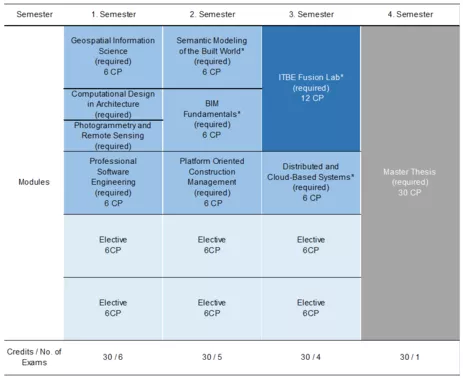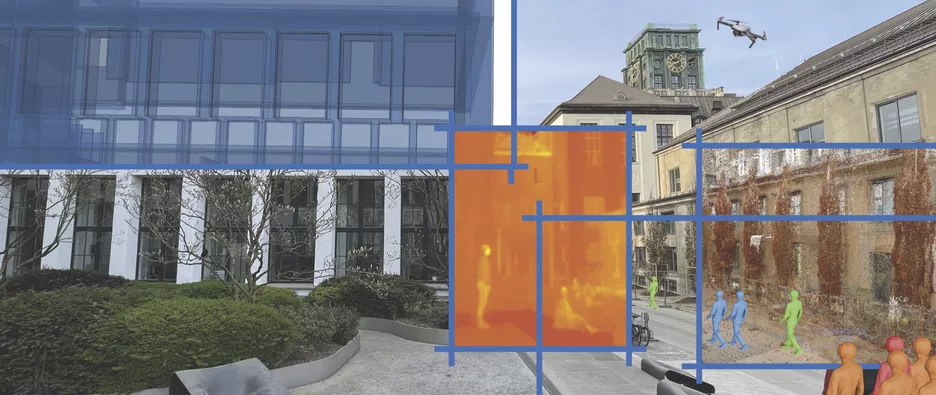Information Technologies for the Built Environment M. Sc.
Information technologies such as digital twins, smart cities, geoinformation systems (GIS), urban and building information modeling (UIM/ BIM), design automation, digital fabrication, remote sensing, artificial intelligence, and human-computer-interaction play a crucial role in shaping the liveability of our urban areas. The ever-growing possibilities in the digitalization of the building industry require specialists who can integrate developments in information technologies across different building disciplines and scales.
In this unique program, students acquire knowledge and competencies in information technologies from architecture, civil engineering, and geodesy. They have the skills to capture, generate, interpret, utilize, and adapt data and information at the interface of different digital systems. They work in interdisciplinary teams to manage, consult on, and create digital components of built environment activities at various stages of the construction lifecycle.
What you'll learn for your future?
Do you want to help shape the future of digital planning and construction processes? Are you interested in buildings, city systems, and information technologies and have a bachelor's degree in architecture, civil engineering, geodesy, information technology, or similar? Then the ITBE M.Sc. opens a wide range of opportunities to you. As a BIM expert, a smart cities specialist, a systems analyst and designer, a software developer, a data acquisitionist, and many more, you will be able to work in planning and surveying offices, for municipalities, or in research and development in both the construction and software industries. Alternatively, you can create your own information technology business to solve related built environment challenges. The choice is yours!
As an expert in information technologies for the built environment, you can consult on, develop, and manage information models and systems, utilizing and combining existing information technologies and creating innovative new approaches within built environments.You will have a holistic, interdisciplinary understanding of information technologies and methods in the building industry. You will have knowledge of domain and technology requirements, challenges, processes, and structures at different construction scales in architecture, civil engineering, and geodesy, coupled with a deep understanding of information technologies, computer science methods, data management, and systems architecture. You will be able to identify and analyze information technology issues in the built world and be capable of selecting appropriate digital methods, developing solutions, identifying necessary stakeholders, and working in interdisciplinary teams.
More information on the M.Sc. ITBE can be found on our TUM ITBE Wiki or in the TUM ITBE FAQ.
Type of Study: Full Time
Standard Duration of Studies: 4 semesters
Credits: 120 ECTS
Main Locations: Campus Munich
Start of Degree Program: Winter Semester (October)
Application Period: Winter semester: 01.01. – 31.05.
Language of study: English
Tuition Fees: for Students from Non-EU Countries
Key Professors: Prof. André Borrmann, Prof. Frank Petzold, Prof. Thomas H. Kolbe, Prof. Konrad Nübel
The program is structured as shown in Figure 1. Compulsory modules ensure students gain the necessary knowledge, skills, and competencies to become ITBE experts. A wide range of elective modules offers the opportunity and flexibility to fill personal knowledge gaps, specialize in a specific area, and learn about cutting-edge technologies within the field.
Of the 36 credits gained through elective modules, at least 21 credits must be included from the elective module catalog "Cross-Cutting Methods." While the built environment as a field lays great value on human-centered engineering and the connection between users and technology are present within many of the modules in this program, the program additionally promotes an active engagement with the topic through the selection of at least 3 credits in the elective area of "Ethics and the Human Factor." Details on how this program differs from other TUM study programs are available on the TUM ITBE Wiki.
Semester Structure
The first semester builds on your bachelor-level knowledge. You will receive state-of-the-art education on information technologies in different building domains (architecture, civil engineering, geodesy) and at different scales. This affords you an overview of the information technology landscape in the built environment and establishes a common understanding of information technology, methods, and terminology.
Modules in the second and third semesters focus on specific built environment information technology issues from multiple (at least two) domain perspectives, generating a holistic and integrated understanding. In the third semester, you will apply this theory in practice within the ITBE Fusion Lab, where you will work in interdisciplinary teams using digital methods to develop a solution to real-world built environment information technology challenges.
For the master thesis in the fourth semester, you will identify a research question of interest to you and select and develop an appropriate method to address a specific research gap in the built environment. You will carry out a scientific investigation and analyze the results. This work will be documented and communicated in a scientific paper and oral presentation.


Please apply through the TUMonline application portal and upload your application documents.
TUM provides a step-by-step guide on applying for a master's.
Who can apply?
Applicants must have at least a bachelor's degree or equivalent educational background in architecture, landscape architecture, urban planning, civil engineering, geodesy, geoinformation, informatics, or a similar degree.
They should have a solid foundation in either the built environment or computer science with a strong interest in the other. This interest must be evident in their previous work and activities.
Required Documents
You require the following documents for your application:
- Degree Certificate and Diploma (certified copy)
- Transcript of Records (certified copy)
- Proof of English Language Proficiency
- Letter of Motivation (in English)
- Complete and Current Résumé (in table format)
- Preliminary Documentation (VDP), if the qualification for graduate studies (e.g., a bachelor's) is obtained outside the EU/EEA. Please apply early for a VDP. If you do not receive the VDP before the application deadline, please upload the signed form "Confirmation that the application for a preliminary review documentation by uni-assist has been submitted in due form and time" in TUMonline to confirm to TUM that you have applied for the VDP in time. The form serves as a placeholder until you can upload the final VDP.
- International applicants may require additional documents depending on their educational background and country of origin.
Aptitude Assessment
A prerequisite for admission to the degree program is the successful completion of the aptitude assessment based on a complete application submission. All applicants that can prove their suitability during this process will be awarded a place. There is a limited number of study places.
The Aptitude Assessment Committee conducts the two phases aptitude assessment. Details on the aptitude assessment evaluation criteria can be found in the M.Sc. ITBE FPSO (Study and Exam regulations).
Phase I
In phase I, suitability will be judged on the following:
- Technical qualification (max. 60 points)
- Bachelor's degree grade (max. 10 points)
- Motivation letter (max. 30 points)
Applicants achieving
- 70 points or more are accepted
- less than 60 points are rejected
- between 60 and 69 points enter phase II
Phase II
In phase II, suitability will be judged on the following:
- Technical qualification (max. 60 points)
- Bachelor's degree grade (max. 10 points)
- Electronic entrance exam (max. 60 points)
Applicants achieving
- 105 points or more are accepted
- less than 105 points are rejected
Technical qualification
Details on the technical qualification can be found in the M.Sc. ITBE Study and Exam Regulations (FPSO) Appendix 2.
Bachelor's degree grade
We ask for a minimum of 2.0 GPA. You may apply with a grade lower than 2.0 GPA, as the grade only makes up one of a number of parts of the aptitude assessment. However, while a grade lower than 2.0 GPA does not automatically lead to the rejection of an application, the application will receive no points for the related part of the aptitude assessment.
Letter of Motivation
A significant part of your application for the aptitude assessment will be a written statement giving your reasons for choosing the M.Sc. ITBE degree program, choosing the Technical University of Munich, and why you consider yourself particularly suitable for the program.
Please comment on the following:
- Your reasons for choosing the M.Sc. ITBE program and why you wish to study at TUM.
- Your abilities, particular talents, interests, career ambitions, and related previous work that make you particularly suited to the M.Sc. ITBE program. Please include evidence of your built environment and information technology interests.
- Program-specific and non-program-specific extra-curricular and related activities or additional qualifications. What do you bring to the program?
Please include proof of your statements within your application. The letter of motivation should be no longer than two A4 pages and must be written in English. The statement must be written by yourself without help; your signature on the application form will confirm this.
Electronic entrance exam
The 60-minute electronic entrance exam consists of basic and application-related bachelor-level questions in areas of the built environment (max. 30 points) and information technologies (max. 30 points). The types of questions include short and long text answers, dropdowns, drag-drop, single-choice, and code runner questions. Questions can include built environment scenario evaluations, critical assessments of structures in the built environment, basics of geometric modeling, awareness of the pros and cons of digitalization, understanding of basic IT concepts, and basic knowledge of connected systems and data acquisition. The entrance exam takes into consideration that applicants come from a diverse range of technical backgrounds with differing levels of knowledge related to the built environment and information technologies.
More details can be found on our TUM ITBE Wiki or in the TUM ITBE FAQ.
